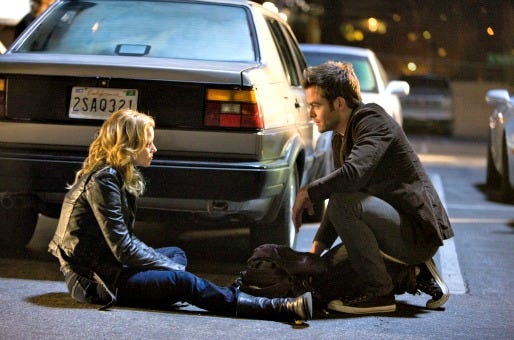People Like Us

"People Like Us" is a tearjerker, and is pretty straightforward about it. I don't have an issue with movies that don't pretend to be something other than what they are. Where I do have a problem is when they aren't successful at it.
To wit: No tears of mine were jerked by this movie.
Speaking of jerks, "People Like Us" is filled with them. At some point during the film, I kept thinking, "Wow, I really hope there aren't a lot of people like them in the real world." If there are, this is one sad, bitter little globe we're riding as it hurtles through space.
This wannabe-weepy drama is about a young jerk who is the son of an old jerk who up and dies, leaving the young jerk with only bitter memories of the old jerk. That, plus a shaving bag filled with $150,000 in cash and a terse note instructing him to deliver it to a single mother who turns out to be the sister he never knew he had.
The young jerk, whose actual name is Sam, is in a tough spot because he could really use the money himself. His gig is "corporate bartering," which means buying up overstock of various goods and sundries and trading it for something else. Except Sam bartered a little too fast and loose, and now the feds are breathing down his neck about some rotten tomatoes or something.
(Quick aside: The federal inquiry is instigated by an unhappy client — the one with the tomatoes — and the investigator starts calling Sam and his boss the very same day it's reported to tell them they're being investigated. That's a pretty responsive bureaucracy.)
Anyway, rather than telling the woman, whose name is Frankie, the whole deal and plopping the money down, Sam start following her around, and also her 11-year-old son, Josh. He does said stalking while driving his father's fire-engine red 1972 Mercury Marquis convertible, a great flaming beast of a car, which somehow does not attract anyone's attention.
Soon Sam has ingratiated himself into their lives, becoming a father figure to young Josh and a support system for Frankie, who's a recovering alcoholic working as a bartender (a Hollywood fabrication, if ever there was one).
The problem with this plot is that it's one of those stories that pivots entirely on the fulcrum of the One Big Lie. An untruth is told — or, in this case, a truth withheld — and the rest of the movie turns into an exercise in waiting around until the moment when everything is revealed. So the only real surprise is in seeing how extreme the reaction to the truth will be. (In this case, it's over the top.)
The screenplay is by Alex Kurtzman, Roberto Orci and Jody Lambert, who inform us this was "inspired by true life." Kurtzman, a TV veteran, directs with little sense of rhythm. The movie turns into a push-pull of characters coming together, then pushing each other away, then back again. It feels like a collection of encounters rather than a knitted whole.
The cast seems a little too perfect for its own good. Chris Pine as Sam brings little to the table that we haven't seen from other rogue-with-good-intentions characters. Elizabeth Banks plays Frankie with more success, as a tough woman putting up a good front over her nagging fears that she's a terrible person and a worse mother. Both are made-up to look scruffy and well-worn, but in a gorgeous Hollywood sort of way.
Michael Hall D'Addario is convincing as Josh, using spot-on facial expressions to show how he reacts to the adults around him with disdain or enthusiasm, depending on what mood strikes. Kids that age are like a combination safe, and few parents get it right more than once in a while.
Michelle Pfeiffer and Olivia Wilde have underwritten roles as, respectively, Sam's mom and girlfriend. They're composed less as flesh-and-blood people than as tools to facilitate Sam's emotional journey — even if they have to behave illogically to do so.
"People Like Us" is the sort of story that would have worked better as a tiny-budget indie film with actors you never heard of. It feels like a meal that's been jazzed up with too much flimflam and unnecessary seasoning instead of concentrating on blending a few key ingredients well.
Rather than making the audience sad, it makes us feel sad for it.
2.5 Yaps



